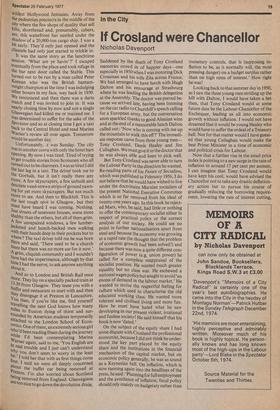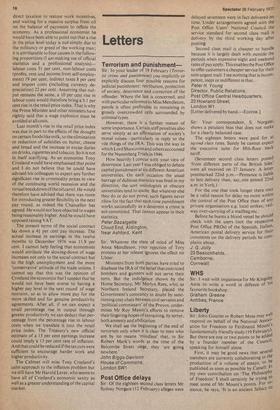In the City
If Crosland were Chancellor
Nicholas Davenport
Saddened by the death of Tony Crosland memories crowd in of happier days—one especially in 1950 when I was motoring Dick Crossman and his wife Zita across France. We had arranged to have lunch with Hugh Dalton and his entourage at Strasbourg where he was leading the British delegation at the Assembly. The doctor was peeved because we arrived late, having been listening on the car radio to Churchill's speech calling for a European army, but the conversation soon sparkled thanks to good Alsatian wine and at the end of a memorable lunch Dalton called out: 'Now who is coming with me up the mountain to walk this off?' The immediate response came from three young men— Tony Crosland, Denis Healey and Jim Callaghan. We must give it to the doctor that he was always able and keen to pick well.
But Tony Crosland was never able to turn the Labour Party in the direction he wanted. Re-reading parts of his Future of Socialism, which was published in February 1956, I do not believe that he would have wished to live under the doctrinaire Marxian socialism of the present National Executive Committee which is so far removed from his ideal of twenty-one years ago. In this book he rejected Marx, who, he said, had little or nothing to offer the contemporary socialist either in respect of practical policy or the correct analysis of our society. He could see no point in further nationalisation apart from steel and because the economy was growing at a rapid rate (he thought that the problem of economic growth had been solved!) and because there was now a quite different configuration of power (e.g. union power) he called for a complete reappraisal of the socialist position. He wanted much greater equality but no class war. He eschewed a national wages policy but sought to avoid 'an excess of demand in the labour market.' He wanted to revive the respectful feeling for culture which used to characterise the old educated working class. He wanted more tolerant and civilised living and more fun. How he must have hated what he saw developing in our present violent, irrational and funless society! He said himself that his book is now 'dated.'
On the subject of the equity share I had some dispute with Crosland the professional economist, because I did not think he understood the key part played by the equity share and the institutions in the financial mechanism of the capital market, but on economic policy generally, he was as sound as a Keynesian bell. On inflation, which is now running again into the headlines of the press, he said : 'Planning for full employment and the avoidance of inflation, fiscal policy should rely mainly on budgetary rather than monetary controls, that is (supposing inflation to be, as it normally will, the most pressing danger) on a budget surplus rather than on high rates of interest.' How right he was!
Looking back to that summer day in 1950, as I saw the three young men striding up the hill with Dalton, I would have taken a bet then, that Tony Crosland would at some future date be the Labour Chancellor of the Exchequer, leading us all into economic growth without inflation. I would not have dreamed that it would be young Healey who would have to suffer the ordeal of a Treasury hell. Nor for that matter would I have guessed that young Callaghan would make the best Prime Minister in a time of economic and political crisis for Labour.
Now that a further rise in the retail price index is pointing to a new surge in the rate of inflation to around 17 per cent per annum, I can imagine that Tony Crosland would have kept his cool, would have advised the Chancellor not to take any drastic deflationary action but to pursue his course of gradually reducing the borrowing requirement, lowering the rate of interest cutting, direct taxation to restore work incentives, and waiting for a massive surplus from oil on the balance of payments to reflate the economy. As a professional economist he would have been able to point out that a rise in the price level today is not simply due to the militancy or greed of the working man; it is attributable to four causes in the following proportions (I am making use or official statistics and a professional analysis)— labour costs 51 per cent, non-labour costs (Profits, rent and income from self-employment) 19 per cent, indirect taxes 8 per cent and import costs (including currency depreciation) 22 per cent. Assuming that output remains the same, a 10 per cent rise in labour costs would therefore bring a 5.1 per cent rise in the retail price index. That is why the Prime Minister and other ministers have rightly said that a wage explosion must be avoided at all costs.
Last month's rise in the retail price index was due in part to the effects of the drought on certain foods like milk, to the elimination or reduction of subsidies on butter, cheese and bread and the increase in excise duties on drinks, cigarettes and tobacco. So it is not in itself scarifying. As an economist Tony Crosland would have emphasised that point and I do not believe that he could have advised his colleagues to expect any further significant rise in commodity prices in view of the continuing world recession and the virtual breakdown of the oil cartel. He would therefore have advised that there was room for introducing greater flexibility in the next pay round, as indeed the Chancellor has agreed. He would not have objected to wages being reasonably higher. And he would have opposed raising VAT.
The present terms of the social contract lay down a 41 per cent pay increase. The actual increase in earnings in the twelve months to December 1976 was 11.9 per cent. I cannot help feeling that economists would attribute the slowing-down of wage increases not only to the social contract but to the high unemployment and the more 'conservative' attitude of the trade unions. I cannot say that this was the opinion of Crosland the economist but suspect that he would not have been averse to having a higher pay level in the next round of wage restraint, so as to allow more pay for the more skilled and for genuine productivity agreements. After all, if we can expect a small percentage rise in output through greater productivity we can deduct that percentage from the percentage rise in labour costs when we translate it into the retail price index. The Treasury's new official estimate of a 15 per cent earnings increase could imply a 13 per cent rate of inflation. And that could be reduced if the tax cuts were sufficient to encourage harder work and higher productivity.
The Cabinet will miss Tony Crosland's calm approach to the inflation problem but we still have Mr Harold Lever, who seems to have all of Crosland's economic sanity as well as a greater understanding of the capital market.



































 Previous page
Previous page